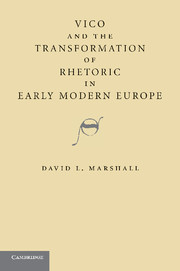5 - Toward a Hermeneutic Theory of Law and Culture
Published online by Cambridge University Press: 06 July 2010
Summary
Vico's extension of rhetorical topoi and tactics beyond the narrow confines of the art of persuasion is both a creative reinvention and, to some extent, a rediscovery. Ancient rhetorical thought had at times been attuned to the transdisciplinary potential of rhetorical inquiry. Take, for instance, antiquity's interest in the basic problem of the relationships among mind, signs, and world that Vico had examined closely in the De antiquissima sapientia of 1710. Vico emphasized what I have called “the semiotic moment” of language, where the mind takes a particular aspect of the world to be indicative of a reality that extends beyond the merely particular. Under such conditions of surprise or shock, a thing can become its own name insofar as the experience of it becomes a point around which similar experiences accrete following the work of ingenium, which classifies like with like. The coming into being of signs is one of the foundational self-creative acts of the mind itself, and this issue of semiosis is a broad problem that appears in a host of guises across the disciplines of antique inquiry.
Thus, even as he is attempting to put limits on good language use in his Sophistic Refutations, Aristotle accepts that homonymy—the use of a single name for several things—is a necessity and not a luxury because, as he says, there are more things in the world than there are names for them.
- Type
- Chapter
- Information
- Vico and the Transformation of Rhetoric in Early Modern Europe , pp. 151 - 192Publisher: Cambridge University PressPrint publication year: 2010



